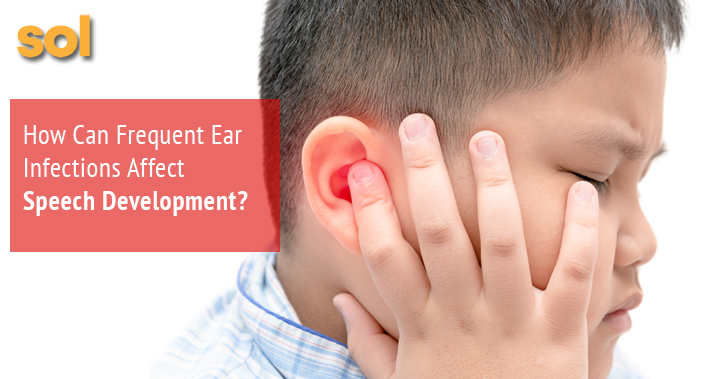
Did you know that your ability to learn language is directly linked to your ability to hear?
It seems obvious enough, but lack of speech development can often be linked back to frequent ear infections in childhood.
Because the overlap of ear infection susceptibility and speech development in children is so large, it’s always a good idea to see a speech and language therapist early on in your child’s life to ensure they’re on the right path.
Read on to find out more about the link between ear infections, speech development, and how pediatric speech therapy can help you and your child.
What Is An Ear Infection?
Your ear is made up of three sections.
These sections are called the inner, outer, and middle ear.
An ear infection is when a viral or bacterial infection disturbs the middle ear.
When the infection reaches the space behind your eardrum, it can lead to fluid buildup and painful inflammation.
This fluid can make it difficult to hear, and can even lead to hearing loss and speech delays in young children.
Symptoms Of An Ear Infection
Knowing that you have an ear infection is your first step in combating it.
This can be challenging as the middle ear isn’t very visible.
It’s not a body part that you can check easily on your own.
Common symptoms of an ear infection include:
- The development of scaly skin in and around the ear
- Decreased energy
- Trouble hearing
- High temperatures
- Irritation and itchiness of your ear
- Ear pain
Any one of these symptoms are easy to identify in yourself, but in children, an ear infection can be hard to detect.
An infant or young child who hasn’t developed speech yet won’t be able to tell you that their ears hurt, but they may:
- Show signs of fever
- Have issues sleeping
- Grasp at their ears with their hands
- Stop responding to sounds
- Cry more than usual
- Have fluid draining from their ear
While you may not be able to detect it yourself, a pediatrician has the tools to investigate your child’s ears and access their condition.
From there you can start a course of treatment.
Why Are Kids More Prone To Ear Infections?
Toddlers and infants tend to experience more fluid and infections in their middle ear than any other age group.
Long term ear infections and fluid buildup can not only affect a child’s hearing but can also have an impact on their speech development.
Most children have at least one ear infection before even turning 1 year old.
In general, children are more prone to ear infections because their Eustachian tube is still in development.
The Eustachian tube’s function is to run from your middle ear to the back of your throat.
When you’re young and still growing, this tube is short and often tilted at an angle that makes it easier for infections to reach it.
Eustachian tubes in children are also prone to developing blockages because of their narrowness.
Aside from physiological factors, children also spend more time in shared spaces where they can contract infections.
Places like nursery schools, daycares, and camps are linked to a higher risk of ear infections.
Of course, these are all places that children frequent.
What Do Ear Infections Have To Do With Speech Therapy?
An integral part of speech development is your child’s ability to hear their surroundings.
Children adopt speech by listening to their caretakers.
They will attempt to imitate noises that they hear as a way to learn them.
The first three years of a child’s life are where they lay the foundation for their speech.
It’s at this time that they learn to form syllables and to say sounds that are later needed to speak fluently.
Ear infections at an early age can make it difficult for children to hear, and in turn difficult for them to learn.
If they can’t hear properly, they may not develop speech properly.
With an ear infection, sounds become muddled and difficult to identify.
Fluid in the ears can be painful, and while that’s not desirable, pain can make the infection easier to detect.
When the fluid isn’t painful, that’s when an ear infection in your child can end up overlooked and untreated.
Some early signs of uninfected fluid in your child’s middle ear look like:
- Your child asking “what?” often, and needing you to repeat yourself.
- Noticing that your child doesn’t seem to understand what you’re saying if you’re facing away from them
- Your child lagging behind their peers in reaching speech milestones.
- A stall or regression in your child’s speech development
If you notice any of these above signs, it may be time to have your child’s ears checked out.
RELATED: How To Tell If Your Child Has A Speech Or Language Disorder

How Can A Speech Therapist Help Children With Frequent Ear Infections?
If you suspect that your child is suffering from ear infections and hearing loss, a speech therapist can help you with an assessment and a care plan.
As a first step, you’ll want to have your child’s ears examined with an ear, nose, and throat doctor (ENT).
An ENT can determine if fluid buildup is causing hearing loss and speech delays.
Once an ENT has diagnosed the cause of your child’s speech and hearing issues, you may refer to a speech-language pathologist.
If your child has missed out on an important speech milestone due to their hearing loss, a speech therapist can help veer them back onto the right path.
Catching up can be a slow process that requires a lot of patience, but it is possible.
Early intervention is also key to minimize the gaps in your child’s development from their ear infections.
A speech therapist can help evaluate your child’s clinical needs and will work with you to create a support plan.
Parental Education
Your speech therapist can help prepare you and your loved ones for your child’s individual needs, through family coaching.
Depending on your child’s level of hearing loss and speech delay, there are different intervention options.
For example, your child may need hearing aids or the help of American Sign Language.
In more severe cases, your child may even need a cochlear implant to replace lost hearing.
A speech therapist will help guide your family on this journey with sensitivity and empathy as your family develops new pathways for communication.
RELATED: Debunking Speech Therapy Myths
Treatment Planning
Depending on your child’s age and level of speech, they may need different materials.
A speech therapist can recommend the best materials for your child’s developmental stimulation.
The more engaging the materials are the more likely your child will be to use them and learn.
Your child’s speech therapist can also recommend activities and strategies to use at home.
Infants, toddlers, and children all have different levels of attention and focus, which means therapists have to be flexible in their approach.
It’s important to stay flexible as your child ages and adjust your care plan as needed.
Much like how your child has many facets to their needs, your speech therapist must adopt a multifaceted approach to their treatment plan.
Hearing Aid Maintenance
Unless you have hearing aids yourself, it’s unlikely you know how to use them.
Knowing how to properly operate your child’s hearing aids or implants is integral to their developing brains.
An audiologist may set up your child’s devices, but your speech therapist will show you how to insert those devices and how to work with them full time.
Book A Consultation With Sol Speech And Language Therapy Today
Speech therapists hold a wealth of knowledge that you and your family can benefit from as you all learn to cope with your child’s needs and daily challenges.
Consult with one of our licensed therapists today to find out how we can help you and your child.
Book your appointment with Sol Speech And Language Therapy today.
6448 E Hwy 290 Suite E-108,
Austin, TX 78723
(512) 368-9488
» https://g.page/r/CfRfhOpEQm7BEAE
Sol Speech & Language Therapy
555 Round Rock W Dr E-221,
Round Rock, TX 78681
(512) 808-3953
» https://g.page/r/Cb5pwCTosSEfEBM
Sol Speech & Language Therapy offers personalized skilled intervention to those struggling with their speech and language skills. Services offered include screening, consultation, and comprehensive evaluation. We also provide one-on-one and/or group therapy for speech sound disorders, receptive/expressive language delay/disorder, stuttering/cluttering, accent reduction, and much more.